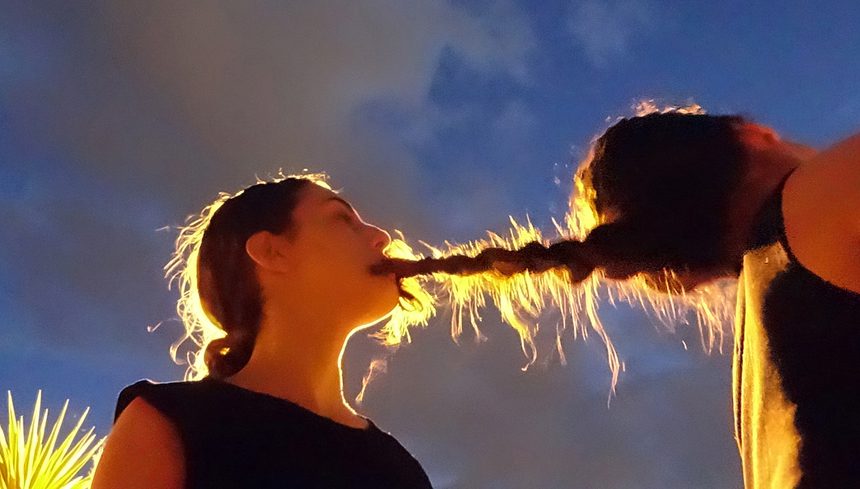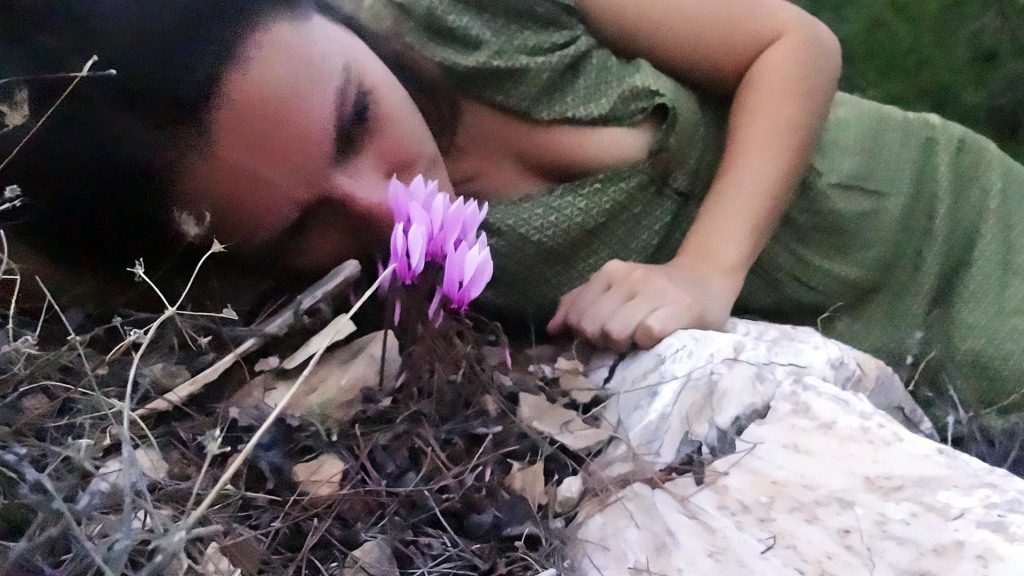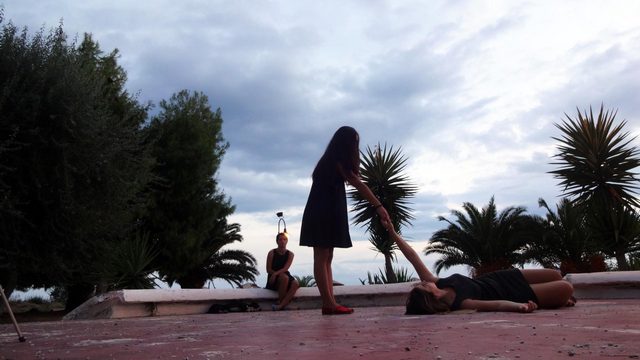INTERVIEW: Alexandros Psychoulis
 Alexandros Psychoulis belongs to the artists that every job is different from the previous one, since the time that he was the first one, that used the new media and technology in his work till today… and this is the big challenge. At the same time, however, he retains some basic visual elements that create a thread to unfold the narration through a process of memory and recognition. In his new work that is on exhibition at the a.antonopoulou.art Gallery entitled “FOR WE CAN NEVER TALK SERIOUSLY (The Girl’s School of Volos)”, deals with a controversial historical subject that stirred the bourgeois society of Volos and no only them… in 1914 and was related to the Greek educational system. Psychoulis using different visual media creates a formulation in space, where all of his work functions as a triptych, as characteristically emphasizes: “It is a three-dimensional knitted monument to language…”
Alexandros Psychoulis belongs to the artists that every job is different from the previous one, since the time that he was the first one, that used the new media and technology in his work till today… and this is the big challenge. At the same time, however, he retains some basic visual elements that create a thread to unfold the narration through a process of memory and recognition. In his new work that is on exhibition at the a.antonopoulou.art Gallery entitled “FOR WE CAN NEVER TALK SERIOUSLY (The Girl’s School of Volos)”, deals with a controversial historical subject that stirred the bourgeois society of Volos and no only them… in 1914 and was related to the Greek educational system. Psychoulis using different visual media creates a formulation in space, where all of his work functions as a triptych, as characteristically emphasizes: “It is a three-dimensional knitted monument to language…”
By Efi Michalarou
Photo: Alexandros Psychoulis Archive
Mr. Psychoulis, in your new work, you are dealing with a true story, the story of the Girl’s School of Volos that is not widely known. Can you talk about the story and for the reasons that attracted you so much, to create a series of new artworks?
Imagine a school that teachers have friendly relations with students, there are no grades, exams for promotion, there are no books but only the student’s notes from the lectures, that the walks in nature are almost daily integrated in the program, and that nature is often the subject of study. An anti-authoritarian school, not consumed in mechanical morning prayers but that promotes critical thinking and opposes the stupid memorization skills. One such school was The Girl’s School of Volos, founded in 1908, with director the demoticist Alexander Delmouzos. Amongst other characteristics, the most scandalous for the society of the era was that teaching was in the demotic language. From the name of school, you can understand that it was directed only for girls. Girls had almost no hope for higher education until then. This school closed three years after its foundation violently.
(What is it that made you to deal with it and what is your point of view) What does it mean for you this entire story, what evidence particular concern you and what aspect you want to express through your work?
The thought that there was such a model of education even today, a century later draw my attention. In Greece looks that such efforts are repeated and continually frustrated. Every time some people manage to make a step forward and after a while, we find ourselves two steps back, or even worse: we demand the obvious. The most interesting thing in the history of The Girl’s School is that Delmouzos, with his program attempted to teach the vernacular language, to teach the girls to write as they think. At that time the problem of bilingualism, purist language versus vernacular language, was not only linguistic but also mainly political and social issue. He thought something that modern linguists admit, that if you change the way you talk about things, you are changing the things. Officially, the language issue that plagued Greece for years, ended in 1974 with the establishment of the vernacular as the official language of the Greek state, but so many years of expressive division left foibles that you can discern in various facets of contemporary sociopolitical life.
The basic upshot of this story was the trial of Nafplio, there was a complete lack of the relevant stakeholders who were the girls, does this is an interesting fact for you to investigate and how?
The executives of the Higher Municipal Girl’s School of Volos, this was the entire title of the school, dragged in court in 1914, exactly 100 years before, accused of taught atheism, maliarism (degrading term for the vernacular language) and Socialism. The trial took place in Nafplio, because in Volos, the spirits were acute and the trial would cause public disturbances. Α year ago I discovered the printed transcript of the proceedings in a store for old books. The transcripts were kept carefully because the trial was the first in Greece for the language issue and had gathered the interest of the scholar people and the press. The witnesses for the prosecution, who were selected from all the levels of society of Volos, were trying to blame Delmouzos for vernacularism speaking in purist language, which they cannot handle with ease so the result were grotesque. The title of the exhibition at the a.antonopoulou.art gallery is “FOR WE CAN NEVER TALK SERIOUSLY”. Within these testimonials is precisely this circumstance. The language gets a hilarious interesting when the absence of other evidence and proofs, make the testifiers to speculate for sexual freedom between the teachers and the schoolgirls. The adolescent of girls occurs almost like disease by moralists witnesses. Of course the girls themselves are absent from the court and generally we have little information on how the students experienced the experience of The Girl’s School and the events that followed. This exhibition is nothing more than an interpretative approach of the gaze of those girls.
You also and Educator, as we all know (Professor in Architecture School of Volos). How much helps you, the contact with the students in your work.
I collaborate frequently with my students every time that I prepare a new work. I felt that the issue concerned them, hundred percent and I could not go ahead without their own contribution. Their age is close to adolescence, which I was researching, further they are inside the troubled Greek educational system thus they were the most appropriate to give me a different perspective of the texts I studied.
Do you believe that the issue of the Girl’s School and the Educational system, you are dealing with, is more pertinent than ever? How and in what way we will change our Educational system? Will be improved and upgraded again, since in the past, we experienced the best periods?
I cannot share your opinion on “the better times.” I remember the years of my second-degree education as black, stressed and lost. I had to memorize useless knowledge that did not functioned anywhere, at the time I wanted to play music, to paint and to fall in love. Even then, there was the certainty that if you strive at school, you will succeed in the professional field so you had to put your head down and defer your desires in the future, in the professional Eden after your studies. Today when unemployment is the most likely prospect for a scientist, we cannot impose intensification as the only proposal to change the education. This is the only way to outrage pupils and students. Moreover, we see that the position “other way I think, the other way I act” is a fact today in government pronouncements for education. The government does not say, “I want to change the Constitution, I want to abolish the free education as they enforce me”, says, “I want to build competitive universities”. However, one simple example of what really is trying to do is this: One of the parameters with which universities evaluated internationally is the proportion of Teachers/Students. The past two years the Ministry dramatically reduced the number of teachers and at the same time has more than doubled the new students in Universities. Disdaining the Greek University in the eyes of the international academic community, but mainly in the eyes of students and their parents. One of the things that should be done immediately and does not need any money for it, is to obtain each level of education its autonomy and center and not to squint all to the University. The rest want much discussion…
The two basic materials used in this series of artworks, are the string that we have come across in your previous works and of course video. How interlock and how add meaning to the exhibition?
You can see the whole exhibition as a triptych. A three-dimensional knitted memorial to the language, a large black lace with a quote from the indictment and a video made from extracts of the testimonies of witnesses for the trial, as interpreted by the students.
The works you create does not seem to have particularly commercial character, and although that someone might think that in the crisis we would see artworks that are commercial, we observe the opposite both from you and from other artists. Do you think that the crisis is a stepping-stone for art creation?
Even in times of prosperity, if you respect yourself does not entrench your expressive characteristics in the criteria required by the art market. To regard the crisis as a stepping-stone for anything creative is as dangerous as the stereotypes that claim unhappiness or mental pain makes us better artists and the “educational flagellation” better scientists. What we call “crisis” carries inside violence and coercion. Someone is forced to start for the beginning and temporarily tries, someone else can yield.
First Publication: www.dreamideamachine.com
© Interview – Efi Michalarou
Info: “FOR WE CAN NEVER TALK SERIOUSLY (The Girl’s School of Volos)”,a.antonopoulou.art, 20 Aristophanous Str., Psirri Athens, Duration: 27/11/14-24/1/1, Days & Hours: Wed-Fri: 14:00-20:00, Sat: 12:00-16:00, www.aaart.gr



